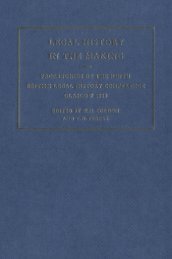130. - Collection Point® | The Total Digital Asset Management System
130. - Collection Point® | The Total Digital Asset Management System
130. - Collection Point® | The Total Digital Asset Management System
You also want an ePaper? Increase the reach of your titles
YUMPU automatically turns print PDFs into web optimized ePapers that Google loves.
242 Structure and the Book ofZechariah<br />
in is not a rare word in the Hebrew Bible, but in Zechariah it only<br />
occurs in 1.4 (2x), 15 and 8.14, 17. <strong>The</strong> same may be said of rntf, 1.4;<br />
3.8; 6.15 (2x); 7.11, 12 (2x), 13; 8.9, 23 only. It should be noted that<br />
6.15 is the last verse of the whole of the second part of Zechariah 1-8;<br />
the phrase is emphatic and comprises part of the concluding conditional<br />
promise. <strong>The</strong> reference in 8.23 is slightly different, but it is<br />
interesting that this also is a final verse and, like 6.15, contains a rare<br />
reference to DTI^K. Again these occurrences give some support to conclusions<br />
reached so far concerning the redactor of Zechariah 1-8.<br />
Tttfpn, 1.4; 7.11. <strong>The</strong>se would support our theory, even though two<br />
isolated references are of uncertain value in themselves. <strong>The</strong>y both<br />
refer to the refusal of the Israelites of old to listen to God.<br />
rrn only occurs in 1.5 in Zechariah 1-8, and then in 10.9, 13.3 and<br />
14.8. <strong>The</strong>re is some similarity between the first two of these: 'the<br />
prophets, will they live for ever?' and 'their children shall live and<br />
return'. 1 Zech. 13.3 has 'You shall not live...' which might conceivably<br />
be related; 14.8 'living waters' is quite different. <strong>The</strong> word is not<br />
distinctive enough to build on.<br />
"DJ> gives us little evidence. <strong>The</strong>re is some affinity between 'my<br />
servants the prophets' (1.6) and 'my servant the Branch' (3.8), but the<br />
other instances are different ('those who served them', 2.13; 'tiller of<br />
the soil', 13.5). However, note once again a connection between 1.1-6<br />
and ch. 3.<br />
ntotf. Although a very common word, its occurrence in Zechariah is<br />
limited, and its repetition in 1.6 has a certain emphasis. <strong>The</strong> infinitive<br />
occurs in 1.6 and 2.4 referring to Yahweh's action in judging his<br />
people and to the action of Yahweh's agents (the four smiths) in judging<br />
the people's enemies. 'Make crowns', 6.11, does not seem to be<br />
related to this. In chs. 7 and 8 the reference is to what the people have<br />
done or are to do. In 10.1 the usage is different: 'Yahweh makes the<br />
lightning'. It would be convenient, but also precarious, to claim that<br />
this word also connects 1.1-6 with chs. 7-8.<br />
Five of the next words may be taken together: ZD~I, DID, DYIK, p 1 ?<br />
and "i^nnn. <strong>The</strong>y all have to do with the two visions with horses. <strong>The</strong><br />
first two occur in Zechariah 9-14, all in relation to battle in some<br />
way. n^d, in 9.11, means 'set free'.<br />
IDO is a common verb, but its use here is restricted in certain ways:<br />
1. It does not seem to have been picked up by other commentators.






